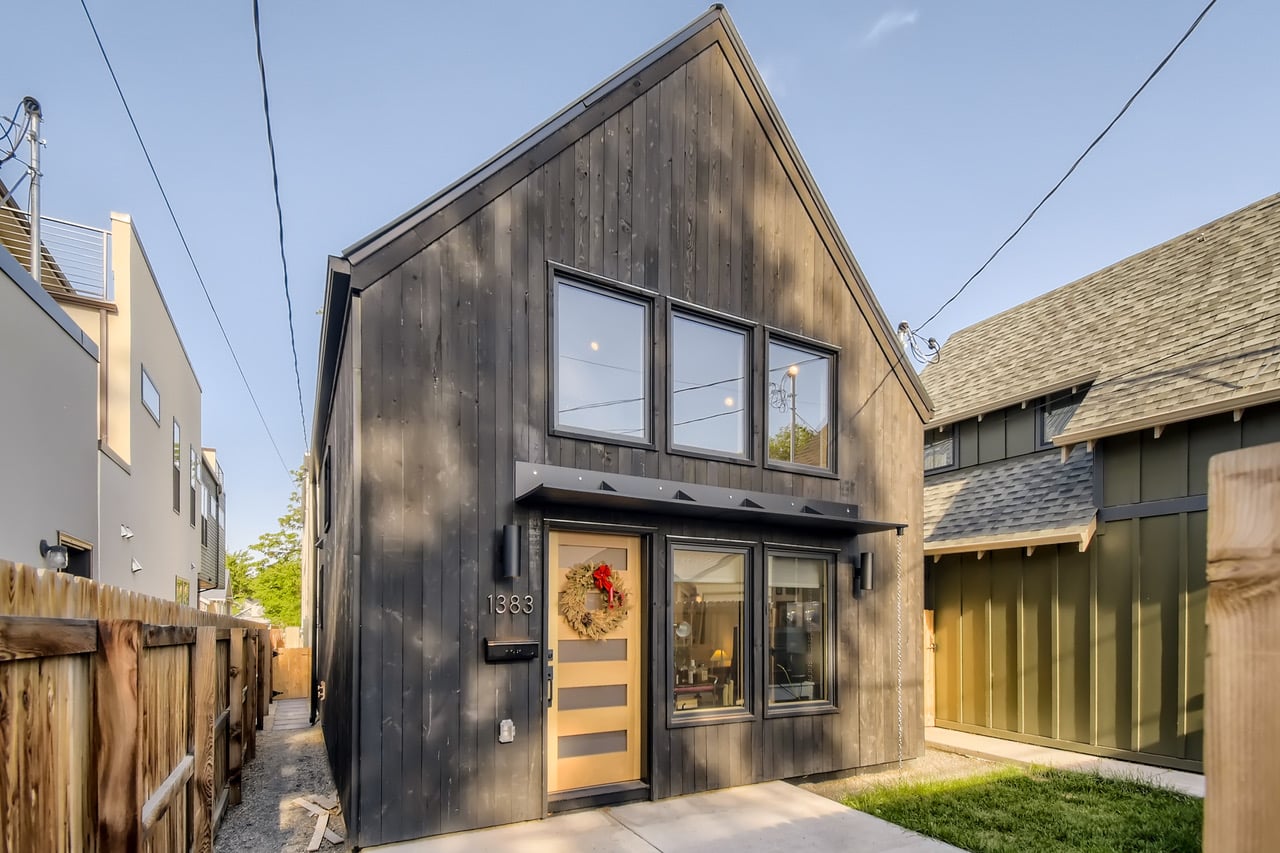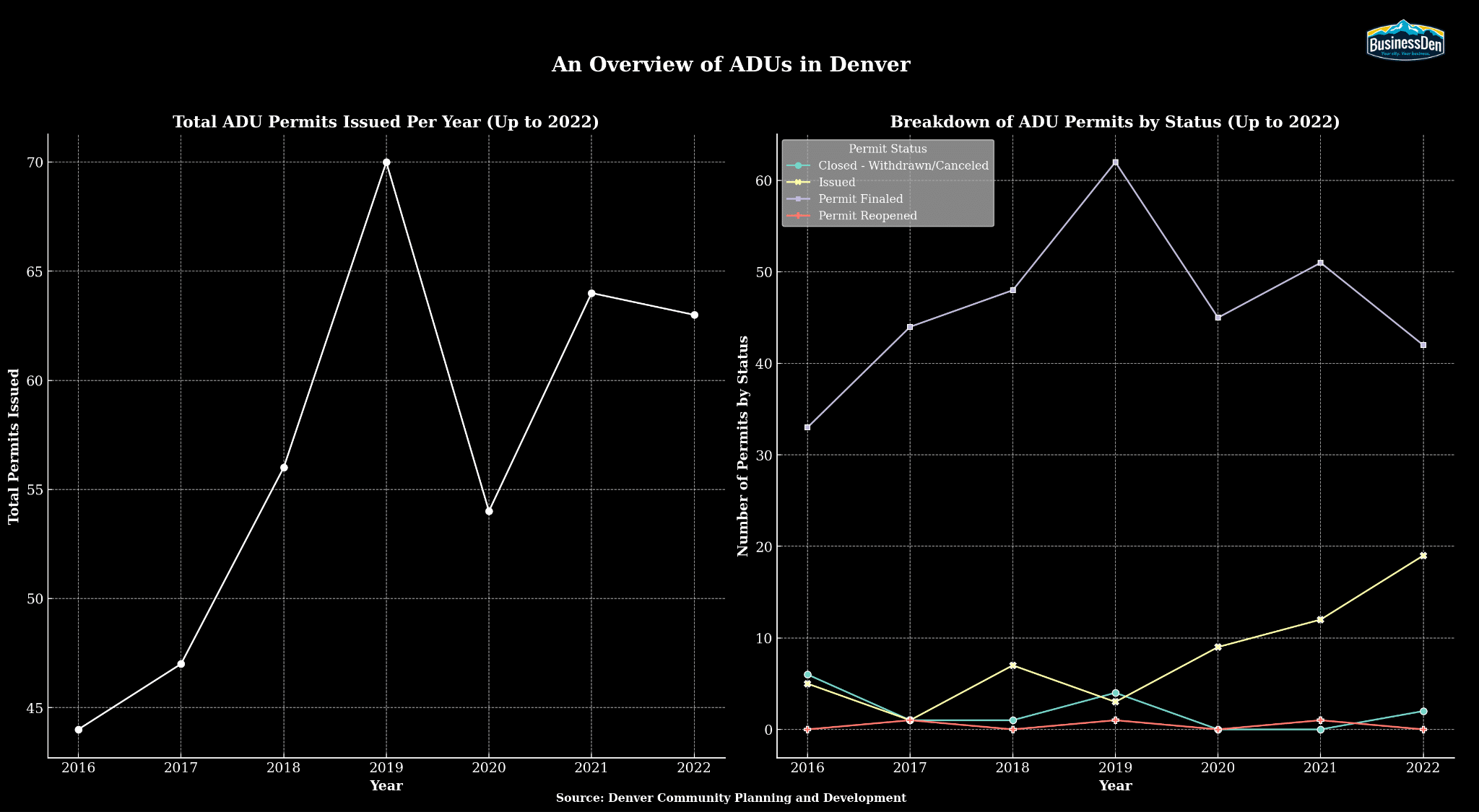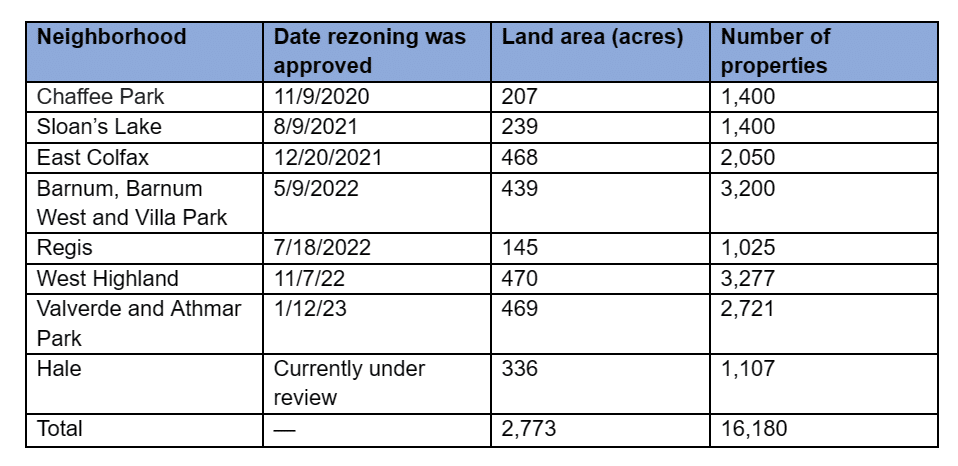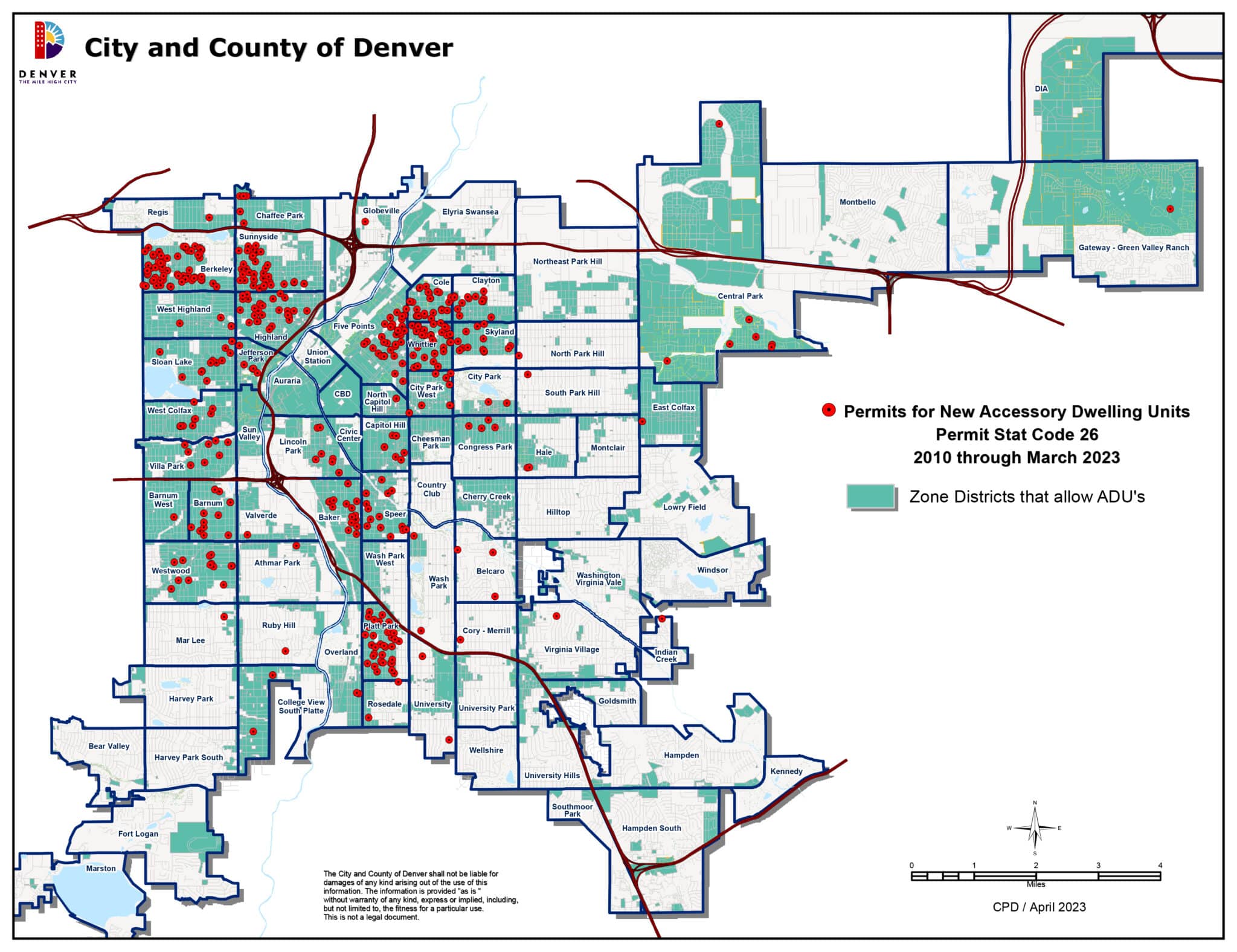
An ADU constructed at 1383 Raleigh St. in Denver by L&D Construction. (Courtesy L&D Construction)
Though its name implies a secondary status, accessory dwelling units have become a priority for Denver city leaders.
Since 2020, the city has been gradually rezoning entire neighborhoods to allow ADUs on most residential properties. Over 30 percent of Denver is now zoned to allow their construction, and a proposal is currently pending for the Hale neighborhood.
ADUs are smaller units built on the same parcel as the main home. They can come attached to the primary building or detached elsewhere on the lot.
Since 2016, the earliest year for which detailed data is available, Denver has issued 456 permits authorizing construction of an ADU, according to Alexandra Foster, a spokeswoman for the city’s Community Planning and Development department. As of this month, 331 of those had been completed.
Over 50 permits have been issued to build ADUs in 2023 so far.
“The city sees ADUs as a form of missing housing,” said Joshua Palmeri, a senior city planner for Denver. “A lot of our residential neighborhoods just consist of two- and three-bedroom homes. And so we think that it’s going to open up different housing options within these communities. Ideally, that it would be more affordable, more attainable than a three- or four-bedroom home.”
Below are graphs showing the number of permits issued in Denver for ADUs. On the graph at right, “permit finaled” means the structure has been built and “permit reopened” means the permit was canceled or withdrawn but has since been reopened and is active.

Zoning laws have traditionally been a sizable hurdle for those hoping to build an ADU in Denver.
“The process is a bit cumbersome … They have to either individually rezone their property or come into us and request a rezoning,” Palmeri said. “That’s a six-to-nine-month process (and) incurs a $1,000 rezoning fee.”
To accomplish that vision, the City Council set out to rezone Denver in a neighborhood-by-neighborhood fashion. A citywide rezoning was not pursued out of a desire to ensure that code accurately reflected the differences between suburban and urban neighborhoods, as well as the fact that not all neighborhoods necessarily want ADU zoning. Councilwoman Amanda Sawyer said earlier this year that the Montclair neighborhood, for example, indicated it wasn’t interested.
Here’s a timeline of recent rezonings, per Foster.

As rezonings come, so do interested builders.
“I would say we get probably about two to three ADU inquiries a week,” said Sarah Senderhauf, sales manager for L&D Construction.
In total, between 12 and 15 ADUs get constructed by L&D each year, said Senderhauf, who participated in a committee advising the council on ADU zoning changes.
“Our company really specializes more in the detached ADUs, the new construction builds,” Senderhauf said. “So, typically what we build is a garage — a two-to-three car garage with living quarters up above. And most of our projects right now, just depending on the size, range from like $375,000 to $450,000 all-in including all of the hard and soft costs.”
Inquiries come from all different neighborhoods, including ones not yet zoned for ADUs, Senderhauf said, but the majority of her company’s builds have been concentrated in West Denver.
Once a property owner commences the process to get the ADU on their property, it takes about a year and a half for the entire project to get completed, Senderhauf said.
“On July 5 of this year, there were a bunch of zoning changes that were implemented into the code and now we can build a full two-story ADU,” she said. “We used to build a one-and-a-half story. There can be decks on the alley – it’s limited on square footage – but there can be a little deck off the alley now; you can have dormers. So the design of these ADUs is really going to help us on the design side in what clients can build in their backyard. We were just pretty restricted before.”


An ADU constructed at 1383 Raleigh St. in Denver by L&D Construction. (Courtesy L&D Construction)
Though its name implies a secondary status, accessory dwelling units have become a priority for Denver city leaders.
Since 2020, the city has been gradually rezoning entire neighborhoods to allow ADUs on most residential properties. Over 30 percent of Denver is now zoned to allow their construction, and a proposal is currently pending for the Hale neighborhood.
ADUs are smaller units built on the same parcel as the main home. They can come attached to the primary building or detached elsewhere on the lot.
Since 2016, the earliest year for which detailed data is available, Denver has issued 456 permits authorizing construction of an ADU, according to Alexandra Foster, a spokeswoman for the city’s Community Planning and Development department. As of this month, 331 of those had been completed.
Over 50 permits have been issued to build ADUs in 2023 so far.
“The city sees ADUs as a form of missing housing,” said Joshua Palmeri, a senior city planner for Denver. “A lot of our residential neighborhoods just consist of two- and three-bedroom homes. And so we think that it’s going to open up different housing options within these communities. Ideally, that it would be more affordable, more attainable than a three- or four-bedroom home.”
Below are graphs showing the number of permits issued in Denver for ADUs. On the graph at right, “permit finaled” means the structure has been built and “permit reopened” means the permit was canceled or withdrawn but has since been reopened and is active.

Zoning laws have traditionally been a sizable hurdle for those hoping to build an ADU in Denver.
“The process is a bit cumbersome … They have to either individually rezone their property or come into us and request a rezoning,” Palmeri said. “That’s a six-to-nine-month process (and) incurs a $1,000 rezoning fee.”
To accomplish that vision, the City Council set out to rezone Denver in a neighborhood-by-neighborhood fashion. A citywide rezoning was not pursued out of a desire to ensure that code accurately reflected the differences between suburban and urban neighborhoods, as well as the fact that not all neighborhoods necessarily want ADU zoning. Councilwoman Amanda Sawyer said earlier this year that the Montclair neighborhood, for example, indicated it wasn’t interested.
Here’s a timeline of recent rezonings, per Foster.

As rezonings come, so do interested builders.
“I would say we get probably about two to three ADU inquiries a week,” said Sarah Senderhauf, sales manager for L&D Construction.
In total, between 12 and 15 ADUs get constructed by L&D each year, said Senderhauf, who participated in a committee advising the council on ADU zoning changes.
“Our company really specializes more in the detached ADUs, the new construction builds,” Senderhauf said. “So, typically what we build is a garage — a two-to-three car garage with living quarters up above. And most of our projects right now, just depending on the size, range from like $375,000 to $450,000 all-in including all of the hard and soft costs.”
Inquiries come from all different neighborhoods, including ones not yet zoned for ADUs, Senderhauf said, but the majority of her company’s builds have been concentrated in West Denver.
Once a property owner commences the process to get the ADU on their property, it takes about a year and a half for the entire project to get completed, Senderhauf said.
“On July 5 of this year, there were a bunch of zoning changes that were implemented into the code and now we can build a full two-story ADU,” she said. “We used to build a one-and-a-half story. There can be decks on the alley – it’s limited on square footage – but there can be a little deck off the alley now; you can have dormers. So the design of these ADUs is really going to help us on the design side in what clients can build in their backyard. We were just pretty restricted before.”

